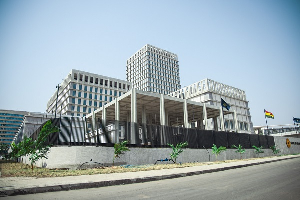 Bank of Ghana's new headquarters
Bank of Ghana's new headquarters
You may have come across the term "policy rate" and wondered what it actually means.
In simple terms, the policy rate, also known as the monetary policy rate (MPR), is a key interest rate set by a country's central bank that directly impacts the broader economy.
It is the rate at which the central bank lends to commercial banks for short-term borrowing.
In Ghana, the Monetary Policy Committee (MPC) of the Bank of Ghana plays a vital role in shaping the country’s monetary policy.
Why is the Policy Rate important?
The policy rate is a powerful tool used by central banks to influence the economy. It directly affects borrowing costs for consumers and businesses.
When the central bank raises the policy rate, borrowing becomes more expensive, which can slow down inflation and reduce excessive spending.
On the other hand, when the policy rate is lowered, borrowing becomes cheaper, stimulating spending, investment, and economic growth.
How does it impact you?
The policy rate influences several financial aspects, including:
Interest Rates on Loans and Mortgages:
Higher policy rates lead to higher interest rates for loans and mortgages, making borrowing more costly for consumers and businesses.
Lower policy rates result in lower interest rates, encouraging people to borrow and spend more, which can help boost economic activity.
Exchange Rates:
A higher policy rate can attract foreign investors seeking better returns, which may strengthen the local currency (the Ghanaian cedi).
A lower rate, however, might weaken the currency.
By adjusting the policy rate, central banks aim to maintain price stability, control inflation, and support sustainable economic growth.
In Ghana, the MPC of the Bank of Ghana meets regularly to review economic conditions and decide on changes to the policy rate. This rate influences inflation, currency stability, and the overall economic environment.
In summary:
The Monetary Policy Committee of the central bank sets the policy rate to achieve key economic goals such as controlling inflation, fostering economic growth, and stabilizing the currency.
The MPC regularly reviews economic conditions and adjusts the rate to balance these objectives.
By influencing borrowing costs, inflation, and economic activity, the policy rate plays a crucial role in shaping Ghana’s economic landscape.
SP/MA
Watch the latest edition of BizTech below:
Click here to follow the GhanaWeb Business WhatsApp channel